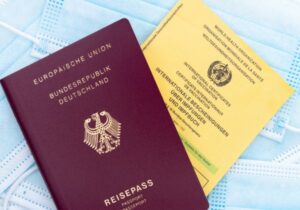
Although German law regarding nationality can be complex, an amendment in 2021 has made it easier for descendants of former German nationals to claim their German citizenship. Additionally, the eligibility criteria for citizenship for victims of persecution during the Second World War were relaxed under the new rules.
This article delves into the intricacies of German citizenship laws regarding lineage, shedding light on the eligibility criteria, application process, and the privileges of reclaiming this historical connection. Whether you’re a descendant of German ancestors or seeking to reconnect with your familial heritage, this guide provides essential insights into acquiring German citizenship by descent.
German Basic Law for Citizenship by Descent
The German nationality laws for jus sanguinis (citizenship by descent) establish the criteria and procedures for individuals entitled to German citizenship. This law recognizes the importance of ancestral ties in determining one’s nationality. According to the basic law on nationality, individuals born to at least one parent who had German citizenship at the time of their birth are eligible to acquire German nationality, regardless of their place of birth.
This provision ensures that the legacy of German nationality can be preserved across generations. However, the right to acquire German citizenship by ancestry is not cut and dry. It requires a nuanced answer based on when the individual was born, whether they had a German mother or German father, and if their German descent had lost their citizenship due to persecution and war.
Am I eligible for German citizenship by descent?
According to German nationality law, you are entitled to German citizenship by descent if your birth falls into one of the categories below.
Children born to married parents
| You are recognized as a German citizen |
| You are recognized as a German citizen under the condition that you would have otherwise been stateless |
| You are recognized as a German citizen |
Children born to unmarried parents
| You are recognized as a German citizen |
| You are recognized as a German citizen |
| You are recognized as a German citizen |
As illustrated, establishing eligibility for German citizenship through descent can be a nuanced procedure. For example, only children holding German citizenship are eligible to receive German passports. Having a German-born father or mother alone does not meet the requirements for acquiring German citizenship. Instead, the child’s father or mother must have been German citizens at the time of the child’s birth.
Furthermore, suppose you are a foreign mother and not married to a German father. In that case, the child is eligible for German citizenship only when the father officially acknowledges his paternity, adhering to the legal requirements in Germany.
Global Citizens Solutions is a seasoned migration consultancy firm with expertise in assessing your eligibility and facilitating the procurement of all the required documents for acquiring German citizenship by ancestry.
Revisions to the German Nationality Act in 2021

The Fourth Amendment was introduced in August 2021, allowing individuals born after 23 May 1949 to a German parent (but were previously denied German citizenship due to discriminatory gender-based rules) to claim German citizenship. The new rules will be in force until 2031. These amendments to Germany’s Nationality Act work in your favor if:
- Your German mother married your foreign father before your birth and had to renounce her German nationality as a result; hence, she could not pass citizenship to you.
- Your German mother married your foreign father before your birth, and the German nationality of you and your mother was rescinded.
- You were born to unmarried parents (out of wedlock), but your father was German while your mother had foreign citizenship; hence, you were not eligible for German nationality.
Reinstating German Citizenship for Victims of Nazi Persecution
Victims of Nazi rule during WWII who, between 30 January 1933 and 8 May 1945, were denied their German nationality based on racial, political, or religious grounds can now reclaim it. If the following conditions apply to you, you are eligible to obtain German citizenship through a declaration:
- You renounced or forfeited your German citizenship prior to 26 February 1955 in order to obtain a foreign nationality or marry a foreigner.
- You were prohibited from obtaining German citizenship through the marriage, legitimization, or naturalization of individuals of German ethnic origin.
- Despite being eligible for citizenship at the time of your application, you were not granted naturalization as a German citizen.
- Despite your eligibility for citizenship when you applied, you were prohibited from acquiring citizenship by naturalization.
- You renounced or lost German residency, provided that you were legally resident before 30 January 1933. Children who established residency after 30 January 1933 are also eligible.
- Descendants in the direct line of individuals listed above
German Citizenship by Descent through Grandparents
The law for descent German citizenship extends to the second generation, meaning a child born to a German father or mother is entitled to German citizenship. Unlike in Italy and Ireland, children born abroad to foreign parents but with German grandparents do not have the automatic right to descent German citizenship.
However, the new rules for German nationality mean that those now entitled to acquire German citizenship can pass citizenship on to subsequent Generations. For example, if your grandparents were former German citizens who had their citizenship revoked or were deprived of German citizenship due to discrimination, your foreign mother or father was also deprived of citizenship.
This means that should your eligible parent acquire German citizenship, you can also acquire citizenship through your citizen parent.
How to get German citizenship by descent?
To acquire German citizenship by descent, you must submit a citizenship application at the German Embassy or Consulate in your country of residence. You can also apply at the German Federal Office of Administration (Bundesverwaltungsamt – BVA). When applying to reclaim your German citizenship by descent, you need to submit your birth certificate and/or your ancestors’ birth certificates. You must prove the link between yourself and your ancestors. Additionally, submit any other documents that prove your eligibility for German citizenship, such as old German passports. The process operates as follows:
- Download and complete the relevant citizenship application forms: You can download a citizenship application form from the German Federal Office of Administration (BVA).
- Gather the required documents: The required documents will depend on your circumstances; however, you will need to provide documents proving parentage. They must be original documents or legalized copies.
- Submit the necessary documents: You must submit the documents at the German Embassy or Consulate in your country of residence or directly to BVA. The documents can be submitted by in person or by post.
- Receive your file number: You will receive a confirmation of receipt of your application from the German Federal Office of Administration via post or email, which will contain your file number. You can use this for future reference.
- Await a decision: After submitting your application, the Federal Office of Administration will notify you if any additional documents or information is required.
- Receive your German citizenship certificate. After your citizenship application is processed, you will receive an invitation to receive German citizenship.
German citizenship by descent processing time
A German citizenship by descent application currently takes two to three years to be processed. The Federal Office of Administration now requires a minimum of 3-6 months just to process and issue confirmations of receipt.
Requirements for German Citizenship by Descent
Before you can apply to acquire German citizenship through descent, you must gather the documents proving parentage to support your case. The documents can include:
- Birth certificates
- Marriage/divorce certificates
- Naturalization certifications
- Family registries
- Certificates or documents of citizenship revocation
- Certifications of acquiring a foreign citizenship
Should you fulfill the parentage criteria for German citizenship, you must include the following documents in your application:
- Criminal record certificate with proof of impunity, proving you have not been convicted of any crime leading to imprisonment or youth detention for two or more years
- Certificate of name change (if applicable)
- Proof of custody (for children 16 and under)
Application Fees of German Citizenship by Descent
There are no fees involved with applying for German citizenship by descent; however, you may encounter fees during the application process for translations, notarization, and postage, if required. The required documents vary depending on your case, some of which may entail a fee to retrieve from the necessary archives.
After you’ve acquired German citizenship, you’re eligible for a German passport. The fees for German passports are relatively low and align with other EU countries. You can expect to pay the following fees:
Type of Document | Fee |
Standard passport (Under 24) | €58.50 |
Standard passport (24 and over) | $81,00 |
Child's passport (12 and under) | €26 |
Benefits of Obtaining German Citizenship by Descent
Obtaining German citizenship will come with a host of benefits, including:
- Live, work, and study in Germany and freedom of movement throughout the European Union
- The world’s strongest passport, according to the Global Passport Index, providing visa-free travel and visa-on-arrival access to 174 destinations
- Access to one of the top ten countries worldwide for quality healthcare services, according to the Legatum Prosperity Index
- Pursue your education at some of the world’s finest institutions and explore job opportunities in leading global industries
- Eligibility for your children to obtain German citizenship through descent
Dual Nationality and German Citizenship
In short, Germany does not permit dual citizenship. However, several exceptions open the possibility of second citizenship and a German passport through acquiring German dual citizenship by descent. These include:
- A person with a German parent and a foreign citizen parent
- A person whose parents hold multiple citizenship status
- A person born in Germany to foreign parents and one or both parents lived in Germany for at least eight years with a permanent residence card
- A person born outside of German territory to at least one German parent, provided they have lived in Germany for at least eight years and attended school in Germany for a minimum of six years
Alternative Ways to Obtain Citizenship in Germany

EU Blue Card: The EU Blue Card targets highly skilled third-country nationals (non-EU/EEA and non-Swiss) for occupations with current or anticipated shortages. The card grants residency for one to four years and is extendable if the employer renews the work contract.
Student Visa: Enrolling in studies at a German educational institution grants you a residence permit for the duration of your studies. While a student visa itself doesn’t automatically grant long-term residence in Germany, being a graduate from a German university significantly enhances your chances of finding a job and obtaining a work permit.
Investor Visa: You can gain long-term residence in Germany by investing in its economy. There is no standard requirement for the visa, and applications are assessed on a case-by-case basis. However, it is generally recommended that prospective applicants invest a minimum of €360,000 in innovative businesses with growth potential, which also generate full-time jobs for German citizens.
After obtaining the necessary visa and living in Germany for eight years, you must fulfill these additional criteria:
- Have the ability to speak the German language
- Pass a naturalization test, proving knowledge of the German legal system, society, and living conditions
- Be able to financially support yourself without social assistance unless exempt
German citizenship by marriage
Marriage to a German citizen offers a pathway to citizenship with a reduced residency requirement. If you have been married to a German citizen for at least two years and legally resided in Germany for at least three, you’re eligible for German citizenship.
Frequently Asked Questions about German Citizenship by Descent
Can I get German citizenship if my ancestors are from Germany?
You may be eligible for German ancestry citizenship through the Fourth Act amending the Nationality Act in Germany, which came into effect in August 2021. If one of your grandparents’ German citizenship was revoked due to racial, religious, or gender discriminatory rules, subsequent generations may be eligible for German citizenship by birthright based on descent.
Can I get German citizenship if my great-grandparents were German?
Revisions to Germany’s nationality laws may provide a path to German citizenship and German passport based on descent through great-grandparents who were deprived of German citizenship. You can become a German citizen by descent, provided that your German ancestors were deprived of German citizenship or had it revoked based on discriminatory rules. This case would require subsequent generations before you to first successfully apply for German citizenship by descent.
What is the German right of return?
The German right of return refers to the right to restore German citizenship to those who were either deprived of German citizenship or had their citizenship revoked based on racial, political, or religious grounds.



